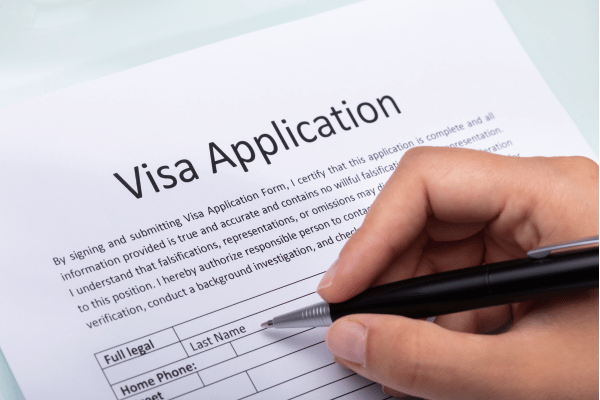Your Moving to Netherlands Checklist: Essential Steps for a Smooth Transition

by Hugh Dixon
Swapping the UK for the canals, culture and charm of the Netherlands is a big step – but it comes with plenty of practicalities to get right before you can truly settle in. From paperwork to finding your new home, it can feel overwhelming without a plan.
That’s where a moving checklist comes in. By getting everything sorted in advance – from visas to housing to healthcare to tax – you’ll avoid the stress and be free to enjoy the opportunities your new life abroad will bring.
In this guide, we break down the steps you need to take before and after moving to the Netherlands. Whether it’s permits, health insurance or civic integration, Simpsons International Removals has got the essentials to help you get started.
Secure Your Visa and Residence Permit
 Understanding the visa requirements is essential before starting your new life in the Netherlands. If you’re an EU, EEA, or Swiss citizen, you’re in luck – you don’t need a visa to live in the Netherlands. However, you must register for a long stay visa with the local government if you plan to stay longer than four months.
Understanding the visa requirements is essential before starting your new life in the Netherlands. If you’re an EU, EEA, or Swiss citizen, you’re in luck – you don’t need a visa to live in the Netherlands. However, you must register for a long stay visa with the local government if you plan to stay longer than four months.
For non-EU residents, the process is a bit more complex. Key points to consider include:
- You’ll typically need a residence permit and may need to apply for an entry visa or visas before your arrival.
- The type of residence permit you require depends on your situation, such as whether you’ll be working, studying, or joining a family member.
- Some residence permits come with specific work restrictions, so it’s essential to understand these details.
- The application process typically involves submitting biometric data, including fingerprints and a passport photo.
Check the latest guidelines from the Dutch Immigration and Naturalisation Service (IND) to make sure you meet all visa requirements. With these preparations in place, you’re one step closer to starting your new adventure in the Netherlands.
Register with the Municipality
Upon arrival in the Netherlands, one of your first tasks is to register with the local municipality. You must complete this step if you plan to stay for more than four months, and it must be done within five days of your arrival. This registration makes you part of the Dutch government’s records and grants you a Citizen Service Number (BSN), which is necessary for various administrative tasks.
To register, you’ll need several documents:
- A valid passport
- A birth certificate
- Proof of address
- If applicable, an employment contract or university enrollment confirmation
Make an appointment with your local municipality to initiate the registration process.
Once registered, your BSN number will allow you to access online government services through the DigiD system and enrol your children in school.
Arrange Health Insurance

Health insurance is mandatory in the Netherlands. You must arrange it within four months of your arrival to avoid fines. All residents are required to enrol in a standard Dutch health insurance package with a Dutch insurer, which covers essential medical services such as general practitioner consultations, hospital treatments, and prescriptions.
While the standard insurance covers most healthcare needs, you can opt for additional coverage for services not included in the standard package, such as dental care or physiotherapy. The BSN is required to obtain health insurance; therefore, please complete your municipal registration first.
By securing your health insurance promptly, you’ll have peace of mind knowing you’re covered for any medical needs.
Find Accommodation
Finding a place to live is a critical step in your move to the Netherlands. Secure housing before your arrival to have a stable base for starting your new life and registering with the municipality. The Dutch housing market is renowned for its diversity, offering a range of options that include historic canal houses, houseboats, and modern apartments. However, it’s also facing a severe shortage, leading to high prices and stiff competition among renters.
To find accommodation, you can:
- Use various rental websites that cater to expats.
- If you encounter difficulties, consider setting up a correspondence address as a temporary solution for your government contacts.
- Consider signing up for home contents coverage to protect your belongings and explore options for permanent accommodation.
With the right preparation, you’ll find a home that suits your needs and lifestyle.
Manage Your Finances
Managing your finances is a crucial part of settling into your new life in the Netherlands. One of the first things you’ll need to do is open a Dutch bank account. To do this, you’ll need:
- Your BSN
- A valid ID
- Proof of address
- If applicable, a residence permit
Several Dutch banks offer offshore account services, and digital banks like bunq and N26 provide convenient banking options without physical branches.
To find the best banking option for your needs, consider the following:
- Compare different banks, as monthly fees can vary.
- In the Netherlands, debit cards are more commonly used than credit cards due to lower transaction fees.
- Familiarise yourself with iDeal, a popular online payment method that allows seamless debit card transactions.
With a well-managed bank account, you’ll be financially equipped for your new life with money.
Transport Your Belongings
Transporting your belongings to the Netherlands can be a daunting task, but with proper planning, it can be a stress-free experience. You have several options, including using a removal company or arranging international shipping services. Companies like Simpsons International Removals offer cost-effective solutions for shipping large household items.
Personal items intended for personal use may be exempt from customs duties, but it’s essential to complete an inventory of all items being shipped, as customs officials will review this during the import process. Online tracking tools can help you monitor the journey of your belongings during transit.
Careful planning and an essential checklist will ensure that all your possessions arrive safely in your new home.
Learn the Language

Learning Dutch is crucial for building connections and feeling comfortable in your new community. Even a basic understanding of Dutch demonstrates a willingness to integrate and is highly appreciated by locals. There are various institutions offering Dutch language courses tailored to different age groups and educational backgrounds, with costs varying depending on the course. If you want to truly connect, it helps to speak Dutch.
Practical language practice opportunities are available through local activities organised by community groups. Consider enrolling in additional language training to improve your proficiency. Investing time in learning Dutch will make it easier to navigate daily life and build meaningful relationships in your new country.
Register for Healthcare
Registering for healthcare is a crucial step once you have obtained your health insurance. Key points to consider include:
- While not mandatory, it is advisable to register with a family doctor (general practitioner) in the Netherlands.
- The BSN you received during municipal registration is crucial for healthcare registration and employment.
- Emergency medical services are included in the standard health insurance policy, ensuring you have access to necessary care when needed.
You can add family members to your health insurance plan. While basic health insurance typically covers most services, additional insurance may be necessary for dental care and physiotherapy. By registering for a healthcare benefit, you ensure that you and your family are well cared for in your new home.
Understand Tax Obligations
Understanding your tax obligations is essential for a smooth transition to life in the Netherlands. Key points include:
- If you reside in the Netherlands, you are taxed on your global income.
- The Dutch tax system categorises income into three distinct boxes, each with its own tax rates.
- New residents may need to complete a tax return if they have multiple income sources or move during the year.
The Dutch government offers several financial benefits, as outlined by the Dutch government’s policies:
- Tax credits, such as the general and labour tax credits, reduce the overall tax payable.
- The 30% ruling, which allows certain expats to have a portion of their salary tax-free.
- Housing benefit and childcare allowances are available for low-income residents.
Understanding these tax obligations and paying taxes will better prepare you to manage your tax payments.
Enrol in Civic Integration
Civic integration is vital for settling in the Netherlands, especially for non-EU partners and spiritual counsellors who must start the process before arriving. Key points include:
- You have three years to complete the civic integration process.
- The process involves learning Dutch and understanding Dutch culture and society.
- EU citizens are exempt from this requirement.
- For others, it is crucial to begin civic integration as soon as possible, particularly for those from the European Union, to achieve complete civic integration.
The civic integration process involves various steps, including language courses and exams. The Burgerservicenummer (BSN) is needed for all administrative tasks related to civic integration. Active participation in this process will make it easier to navigate life in the Netherlands and integrate into the community.
Plan for Children’s Education
Planning your child’s education is essential when moving to the Netherlands. Key points to consider include:
- The country has 53 international schools offering diverse curricula, primarily in English or other languages.
- Dutch schools provide a curriculum in Dutch.
- Children must attend school from ages 5 to 16.
- Enrolling your child in a school is one of the first tasks you’ll need to complete.
To enrol your child, you may need to provide their birth certificate and obtain a temporary education number from the Education Executive Agency (DUO) if they are not yet registered. Children under 18 are required to have health insurance, but they are not charged premiums for the standard package.
Planning ahead ensures a smooth transition for your child’s education.
Prepare for Work
Understanding the different work permit requirements is part of preparing for work in the Netherlands:
- Foreign workers from non-EEA countries typically need a work permit.
- EEA and Swiss nationals are exempt from requiring a work permit.
- The type of work permit required depends on the duration of your employment; longer stays generally necessitate a GVVA.
- Employers must demonstrate that they cannot find suitable candidates within the EU to be eligible for a work permit for foreign nationals.
Highly skilled migrants who contribute to the knowledge economy are typically exempt from the requirement of a work permit. The tech and finance sectors offer numerous job opportunities for expats, but not speaking Dutch may limit employment chances.
Understanding these requirements and preparing accordingly will get you ready to embark on your basic qualification journey while working in the Netherlands.
Transport and Driving
Navigating transportation in the Netherlands is relatively easy, thanks to the extensive cycling infrastructure and efficient public transport options, including trains, trams, buses, and ferries. If you plan to drive, it’s important to carry the following at all times:
- A valid driving license
- Proof of identity
- Motor insurance
- The vehicle registration document
New residents must exchange their foreign driving license for a Dutch one within 185 days of arriving. The process involves visiting the local council (gemeente) and meeting specific requirements.
Knowing these transportation options and driving requirements will make it easier to move around the Netherlands.
Bringing Pets

Complying with specific regulations is necessary when bringing your beloved pets to the Netherlands. Pets coming from EU countries need an EU pet passport, a rabies vaccination, and an ID chip. The rabies vaccination must occur when pets are at least 12 weeks old and at least 21 days before travel.
For pets arriving from non-EU countries, a blood test may be required, depending on the rabies risk of the country of origin. If importing pets from outside the EU, a customs declaration may be necessary under specific conditions. Researching restrictions and preparing accordingly will ensure a smooth transition for your furry friends.
Important Documents Checklist
The right documents are crucial for a successful move. Ensure the following:
- Your passport or ID card is valid for at least three months after your arrival if you are not a Dutch national.
- You may need to legalise your documents.
- You may need to translate your documents into one of the following languages: Dutch, English, French, or German, depending on their original language.
Prepare documents confirming your nationality, residency history, and any changes in civil status, such as marriage or divorce certificates. Apostille certification can simplify the process of validating documents in the Netherlands if they originate from a country that is a member of the Apostille Convention. Organising these important documents will prepare you well for various administrative tasks.
Cultural Integration
Understanding Dutch culture is crucial for integrating into society. Important cultural aspects include:
- Direct communication is highly valued, with straightforwardness seen as a sign of efficiency.
- Punctuality is crucial.
- Maintaining personal space is important in social interactions.
- When invited to someone’s home, it’s customary to bring a small gift as a token of appreciation.
Participating in local festivals and cultural events is a great way to immerse yourself in Dutch traditions. Cycling is not just a mode of transportation but a significant part of Dutch identity, supported by an extensive network of bike paths. Embracing these cultural norms will make it easier to integrate into Dutch society.
Emergency Contacts
A list of emergency contacts is essential for your safety and peace of mind in your new country. Here are some important numbers:
- For non-emergency police assistance, you can reach the police at 0900-8844.
- In the event of a missing child, the EU country hotline, 116 000, should be called.
- For gas or electrical emergencies, call 0800-9009.
- Victim support can be reached through the helpline 0900-0101.
The Amber Alert system notifies the public of a missing child with relevant details, and the NL-Alert system sends text alerts to mobile phones in emergency situations. Additionally, for any weather-related emergencies, the KNMI issues alerts to affected areas. Keeping these contacts handy will prepare you for any unexpected situations.
Staying Connected
Setting up essential utilities and internet services is necessary for staying connected in the Netherlands. When moving into a new home, consider the following steps:
- Choose your energy provider, allowing for flexibility based on cost and service preferences.
- Arrange utility services such as electricity, gas, and water within five days of key collection.
- Identify your water provider using your postcode, as water providers are region-specific.
The Dutch internet infrastructure is among the fastest globally, with nearly all homes having access to broadband. Setting up an internet connection can take up to three weeks, so it’s advisable to choose a provider early and plan accordingly.
The DigiD system is used for interactions with Dutch government bodies, ensuring you stay connected with essential services. Organising these utilities promptly ensures a smooth and seamless transition to your new life.
Summary
Moving to the Netherlands is more than just a change of address—it’s the beginning of an exciting new chapter filled with opportunities and fresh experiences. By following this checklist, you’ll be well-prepared for the practical steps of settling in, from paperwork and healthcare to housing and integration into Dutch life.
At Simpsons International Removals, we know that the logistics of moving overseas can be the most stressful part of the journey. That’s why we provide a complete door-to-door service, whether you’re sending a few boxes or relocating an entire household. From professional packing and shipping to customs clearance and safe delivery to your new home, we take care of every detail so you can focus on your new life in the Netherlands.
Ready to get started? Get a free online quote today or explore our Removals to Netherlands page for expert advice and step-by-step support on making your move as smooth as possible.
Frequently Asked Questions
Do I need a visa to move to the Netherlands if I’m from an EU country?
As an EU citizen, you do not need a visa to move to the Netherlands; however, you must register with the local government if your stay exceeds four months.
How soon after arriving do I need to register with the municipality?
You must register with the municipality within five days of your arrival if you intend to stay for more than four months. Failure to do so may lead to complications with your residency status.
Is health insurance mandatory in the Netherlands?
Yes, health insurance is mandatory in the Netherlands; you must obtain it within four months of your arrival to avoid potential fines.
Can I bring my pets to the Netherlands with me?
You can bring your pets to the Netherlands, but you must ensure they have an EU pet passport, a valid rabies vaccination, and an ID chip. Ensuring these requirements are met will make your pet’s travel smooth and compliant.
What documents do I need to bring for registration purposes?
You will need to bring a valid passport, birth certificate, proof of address, employment contract, and any additional documentation required for registration purposes. It’s crucial to have these documents prepared to ensure a smooth process.
Recommended Posts

Driving in the Netherlands: Essential Rules and Tips for a Smooth Ride
Wednesday, 27th August 2025

Top Benefits of Moving to Netherlands: A Comprehensive Guide
Friday, 27th June 2025

Top Things to Do in the Netherlands When You Live There
Thursday, 21st November 2024


